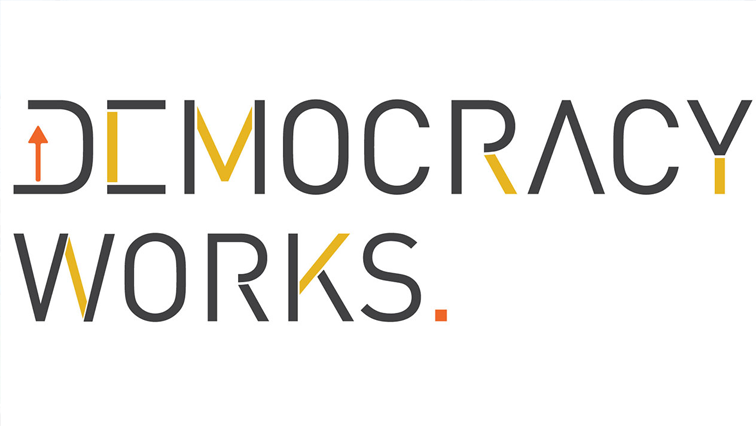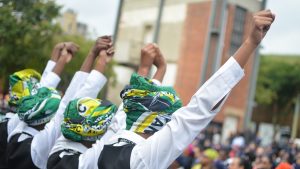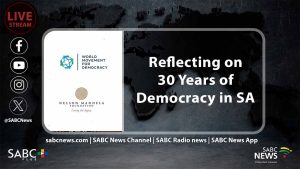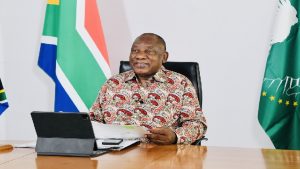The past decade should remind South Africans that democracy does not always work the way that it should. Democracy remains elusive, it doesn’t simply arrive at a particular point in time. It ebbs and flows, sustained by the continued interactions between a variety of different stakeholders within the broader political ecosystem.
Within all this complexity, conflict and fluidity, it is understandable that we continually want to break things down into less intimidating units of analysis. Multi-actor and layered political processes are reduced to ‘easy to digest’ stories, often of how one exceptional individual, group, organisation or political party ‘saved the day.’
This means our social and political interactions and our civic responsibility, are pushed aside, in favour of colourful, yet simplistic narratives about the heroes and villains of democracy.
Citizens become spectators within the political space, their involvement limited to cheering on their chosen ‘political champion’ from the side. It entrenches the belief that someone will either save us or destroy us, with little real space for ordinary citizens to make an impact beyond the vote or the occasional protest.
Inclusive democracy and the process of consensus building and choice work becomes impossible, as the ecosystem is gradually eroded. Civic voices are replaced by the loud roars of a few elites, their legitimacy based on how many they could mobilise towards their particular agenda.
What makes our democracy vulnerable and open to capture by powerful individuals, families or interest groups? What happens when ordinary citizens feel that their voice is drowned out by the political party processes?
The resignation of Jacob Zuma as the president of South Africa on 14 February 2018, was celebrated across a broad segment of society, from opposition parties and civil society to within the African National Congress itself. For many, his removal brought a sigh of relief and an opportunity for democratic renewal.
Zuma is gone, giving the new political representatives an opportunity to now focus on rebuilding the country. At least, this seems to be the easy answer.
There is more to our democratic society than just one man or woman. Deeper than this, addressing the strengthening of our democracy will require the work of all citizens, irrespective of their individual views or political affiliations. Democracy is not a spectator sport.
We need to relearn how to organise and communicate across political and ideological divisions. This might be a more complex ecosystem to navigate, but it will ultimately strengthen the very fabric of our democracy, rebuilding connections across divides, making the entire democratic ‘ecosystem’ more resilient to internal and external shocks.
South Africa is a constitutional democracy, and the constitution provides for both political representation and formal participative structures. This means that ordinary citizens will not only have to be consulted but also to be involved and participate in the decisions, whether economic, political or social, that affect them.
Political representation, according to the Parliament of South Africa, means “citizens do not govern the country themselves, they elect (vote for) other people to represent them in government”. Civic democratic agency is limited to periodic elections as a way to hold political representatives accountable. To address this, the South African Constitution allows for formal processes, forums, and institutions to broaden and deepen democratic practices beyond the vote.
While these formal avenues of participation create spaces for civil society, advocacy and interest groups to organise and make their voices heard, the ordinary citizen can too often be marginalised. Steven Friedman explores the limits of popular participation, where it means ‘connected’ individuals’, or ‘community organisations’ would be the main participants, acting on behalf of ‘entire residential communities’. Civil society and the media often fall into this trap, framing discussions in such a way that only the ‘right’ or ‘democratic’ voices are represented.
How can ordinary people be a part of the process, irrespective of their educational background or socio-economic position? How can ordinary citizens become aware of the ‘power within,’ an opportunity to be involved in constructing a more inclusive and democratic society instead of being a spectator cheering on politicians from the margins?
This rethinking of citizen action goes further than just political representation or participation. It represents an opportunity where ordinary citizens “use rights, methods, and channels of their choice to compel governments to deal with them on their terms, not those convenient to power-holders.”
This rethinking of democracy as a continued, inclusive and developmental process is described by Professor Harry Boyte as ‘developmental democracy’, focusing on the “work of growing capacities for self-directed action across differences for problem solving and the creation of individual and common good.”
Developmental democracy engages citizens, irrespective of their ideological views. It continually re-connects individuals, groupings and actors across lines of difference, creating a ‘safe space’ for collaborative experiments in public work. Invented civic spaces are less formal in structure, at times more chaotic and difficult to discern, compared to the more formalised, controlled and manageable formal or ‘invited’ spaces.
It is within these opaque spaces where we can find stories of citizens trying to re-engage by finding common ground, re-imagining the potential for common/public work in spite of diverse racial, class, political or gendered identities.
President Ramaphosa is faced with a South Africa where the fissures between different groups are laid bare. Divisions often spill into open conflict between interest groups, with little or no space for conversations between these groups. While this might be uncomfortable, it is a space with potential. It challenges business to think outside the comfort and perceived safety of gated, guarded office parks.
Equally, it challenges civil society and the media to consider different sides to a discussion. It invites more radical voices into boardroom discussions, presenting us with more opportunities and options towards achieving social justice.
The goal should not be in silencing those that do not see the world as we do, but rather learning (as we did in the 1980s) to listen, understand and incorporate different views through identifying common ground. Civic work goes beyond just making sure your favoured individual or political party is in control.
Civic work reconnects across ideological divides, energising ordinary citizens to explore how they can “work with fellow citizens on public problems”.
We need to re-learn how to build that common ground within our society. This is not the time to gloatingly flaunt that we have a pro-business president. Rather it is a time to ensure that a more neo-liberal approach will not further marginalise and exclude a large section of society. Democracy is more than just majority rules.
For democracy to be sustainable, it needs to involve all voices within the society, allowing them to be part of the process of consensus- building.
In this way, ordinary citizens have a better understanding that there are no one-step, quick-fix solutions. It will move us beyond the era of empty slogans crafted to mobilise support, towards a more informed and engaged citizenry, organised across divides. It is not a conflict-free space. It is a space where participants realise that every political choice comes with benefits and baggage.
Post-Zuma South Africa needs to put aside the hope that one man, another Mandela-like figure, will solve all our problems. The challenges within South Africa are deep and complex. It is time to realise that the solution lies not in one man and a selected team of elites, nor within another political party. Rather, it is time to address the growing disconnect between the various groupings in our society.
How can we start organising citizens across divides, towards a more inclusive democratic consensus? This re-thinking of democracy as work places agency back in the hands of ordinary citizens instead of leaving them beholden to a ‘benevolent’ state or groupings of ‘representative’ organisations speaking on behalf of them.
The real goal is not only to redistribute wealth in a country where there is a growing gap (that reflects racial divisions) between rich and poor. The goal is to develop the agency of all citizens to contribute, despite conflicts, to deal with the substance of society (the people) instead of only the structure of society. This is a call to rediscover the public commons, that civic space we all share.
The work of democracy is hands-on, constant and layered. Conflict has to be managed throughout, through reminding the players of common ground and building bridges that allow for a diversity of views. This approach doesn’t ask a participant to participate based on the fact that they saw a solution in the ‘right’ way. It simply argues that, for democracy to work as it should, everybody needs to be included in the work.
South Africa has a history of extraordinary and visionary men and women who had an innate ability for building bridges across divides. Their legacy should encourage further civic work, instead of civic malaise and frustration while we wait for the next ‘leader moment’.
We must remain wary of those that want to capture individual narratives towards a particular, walled-in political agenda. In order for our democracy to remain robust, we need to look at ways to engage beyond the boundaries of political and ideological identities.
Jaco Roets is a Contributor to Democracy Works Foundation.






